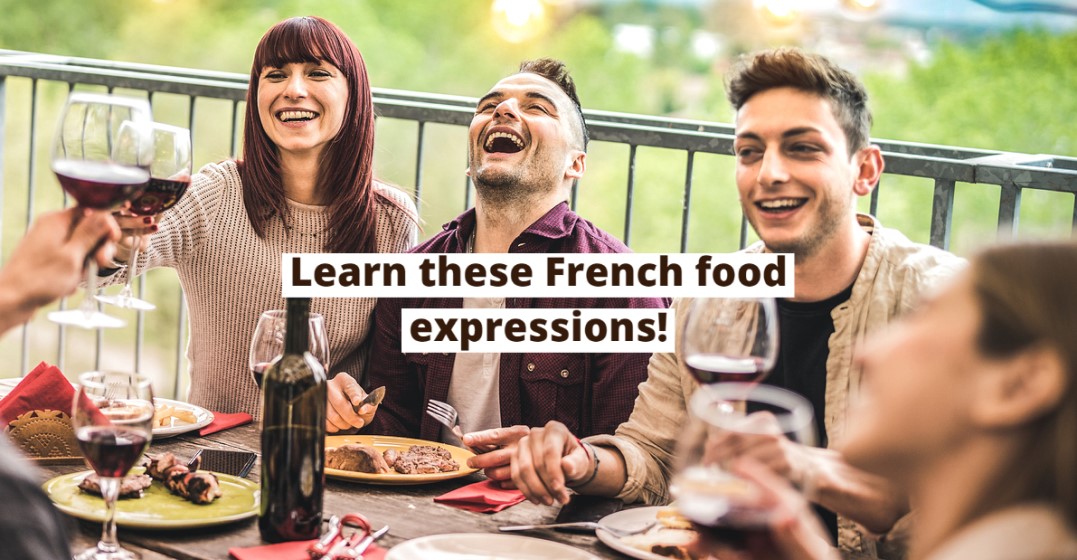Updated on January 8, 2024

The Best French Expressions About Food

Do you have “une faim de loup”? Are you hungry « like a wolf »? This blog is for you! Here’s a selection of French expressions to whet your appetite.
Avoir la pêche
Literally: To have the peach.
It also works with la banane / la frite / la patate (banana/fries/potato). These ingredients are full of energy, so the expression means you’re in shape. “Avoir la banane” also means you’re very smiling because the shape of the fruit refers to the smile on your face.
Tomber dans les pommes
Literally: To fall into apples
No, it has nothing to do with cooking or harvesting apples. For some obscure reasons, this expression means “fainting”. You can say, « Je n’ai pas mangé ce matin, et je suis tombée dans les pommes. » = “I didn’t eat this morning, and I fainted.”
Using the same fruit, the French can also say of a person that she is « haute comme trois pommes ». Literally “tall as three apples”, this is an exaggeration to refer to a fairly small person (often a child).
Prendre le melon
Literally: to take the melon
The melon will refer to a person’s head. Can you guess? The French use this expression to criticise a proud, overconfident person. The melon refers to the head of that person who may have swollen because of his pride.
Se prendre le chou
Literally: to take oneself the cabbage
Here’s another vegetable that represents the head of a person (like our famous singer Serge Gainsbourg, « l’homme à tête de chou »). But this time, the expression doesn’t refer to pride, but rather to a quarrel. If you “take the cabbage” with a friend, your family or your colleagues, it’s because you’ve had an argument with them. But don’t worry, “se prendre le chou” is just a passing fuss. Usually, with a good explanation, you can quickly make up for it.
With the same vegetable, you will be able to say almost the opposite. If you tell someone that “il est chou” (usually a baby), he’s cute!
Les carottes sont cuites = C’est la fin des haricots !
Literally: The carrots are cooked = It’s the end of the beans
Here are two expressions with a very close meaning and yet composed of two different vegetables. If you hear one of the two expressions, it means it’s over! There’s nothing more to do, it’s too late, there’s no more hope. The expression « c’est la fin des haricots » is even a step higher since it means that it is the end of the world (often used in an ironic or sarcastic way).
Poireauter
Literally, “to leek.”
Like a leek planted in the ground without moving, “poireauter” means waiting a very long time. You can say: « j’avais rendez-vous à 10h mais j’ai poireauté jusqu’à 11h. » “I had an appointment at 10 am but I waited until 11 am. »
C’est un navet !
Literally: It’s a turnip!
Have you seen a bad movie recently and you want to express yourself? Well, you can use this expression!
Raconter des salades
Literally: Telling salads
It’s nothing to do with Caesar. “Raconter des salades” means telling lies.
Cracher dans la soupe
Literally: Spit in the soup
The soup used to be considered an essential food. So spitting in it meant refusing something that was perceived as beneficial. So the French often use this expression in a negative form: “je ne vais pas cracher dans la soupe” (I’m not going to spit in the soup).
Va te faire cuire un œuf !
Literally: go cook yourself an egg.
That’s a nice colourful expression to tell someone to leave you alone, politely and without vulgarity.
Je ne suis pas dans mon assiette
Literally: I’m not in my plate.
It doesn’t mean that you’re too fat to fit on the plate, but that you’re not in your normal state, maybe a little depressed, sick or pensive.
Avoir le cul bordé de nouilles
Literally: to have an ass full of (or surrounded by) noddles
That’s my favourite expression because it’s completely crazy! Literally, I wonder how one could have created such a colourful expression so far from its meaning. If your ass is surrounded by noodles, that’s a good thing! It means you’re very lucky. You can use it like this: “il a gagné deux fois au loto, il a le cul bordé de nouilles” (“he won the lottery twice, his ass is surrounded by noodles”). But beware, this expression is pretty familiar as you can imagine, so don’t use it with anyone!
If you’d like to start putting your French skills to for the test, visit our website and sign up for your 7-day free trial with our native French speaking teachers.